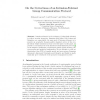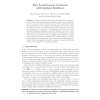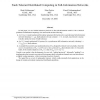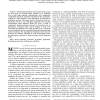60 search results - page 7 / 12 » Self-stabilizing byzantine agreement |
CHARME
2003
Springer
14 years 21 days ago
2003
Springer
Intrusion-tolerance is the technique of using fault-tolerance to achieve security properties. Assuming that faults, both benign and Byzantine, are unavoidable, the main goal of Int...
WDAG
2010
Springer
13 years 5 months ago
2010
Springer
Abstract. We give randomized agreement algorithms with constant expected running time in asynchronous systems subject to process failures, where up to a minority of processes may f...
OPODIS
2004
13 years 8 months ago
2004
Consider an asynchronous system where each process begins with an arbitrary real value. Given some fixed > 0, an approximate agreement algorithm must have all non-faulty process...
FOCS
2006
IEEE
14 years 1 months ago
2006
IEEE
In this paper, we use random-selection protocols in the full-information model to solve classical problems in distributed computing. Our main results are the following: • An O(l...
TDSC
2011
13 years 2 months ago
2011
— Randomized agreement protocols have been around for more than two decades. Often assumed to be inefficient due to their high expected communication and computation complexitie...




